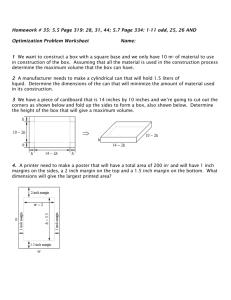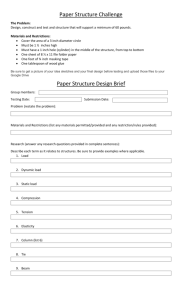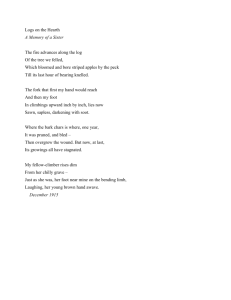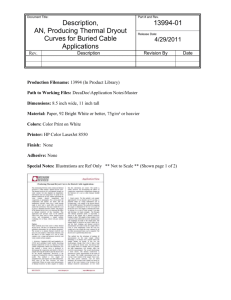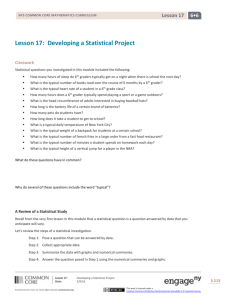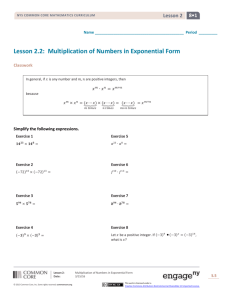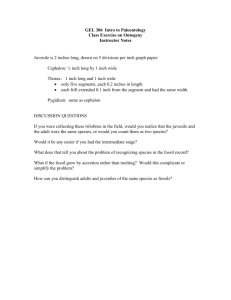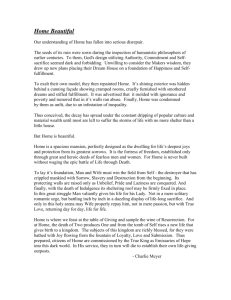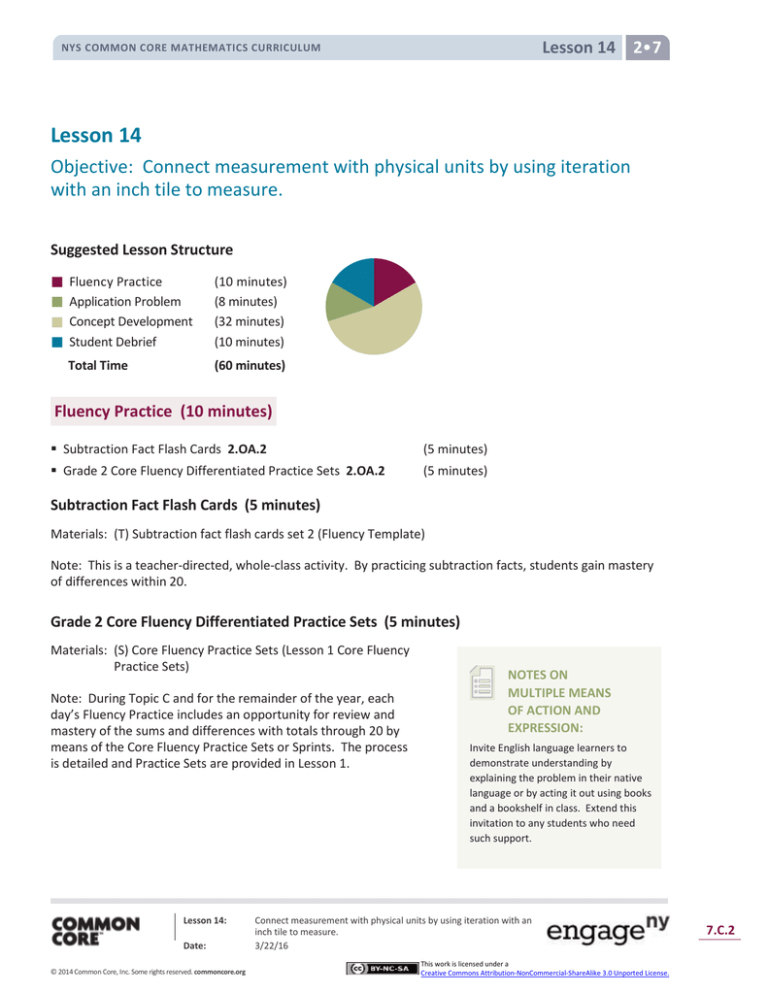
Lesson 14 2•7
NYS COMMON CORE MATHEMATICS CURRICULUM
Lesson 14
Objective: Connect measurement with physical units by using iteration
with an inch tile to measure.
Suggested Lesson Structure
Fluency Practice
Application Problem
Concept Development
Student Debrief
Total Time
(10 minutes)
(8 minutes)
(32 minutes)
(10 minutes)
(60 minutes)
Fluency Practice (10 minutes)
Subtraction Fact Flash Cards 2.OA.2
(5 minutes)
Grade 2 Core Fluency Differentiated Practice Sets 2.OA.2
(5 minutes)
Subtraction Fact Flash Cards (5 minutes)
Materials: (T) Subtraction fact flash cards set 2 (Fluency Template)
Note: This is a teacher-directed, whole-class activity. By practicing subtraction facts, students gain mastery
of differences within 20.
Grade 2 Core Fluency Differentiated Practice Sets (5 minutes)
Materials: (S) Core Fluency Practice Sets (Lesson 1 Core Fluency
Practice Sets)
Note: During Topic C and for the remainder of the year, each
day’s Fluency Practice includes an opportunity for review and
mastery of the sums and differences with totals through 20 by
means of the Core Fluency Practice Sets or Sprints. The process
is detailed and Practice Sets are provided in Lesson 1.
Lesson 14:
Date:
© 2014 Common Core, Inc. Some rights reserved. commoncore.org
NOTES ON
MULTIPLE MEANS
OF ACTION AND
EXPRESSION:
Invite English language learners to
demonstrate understanding by
explaining the problem in their native
language or by acting it out using books
and a bookshelf in class. Extend this
invitation to any students who need
such support.
Connect measurement with physical units by using iteration with an
inch tile to measure.
3/22/16
This work is licensed under a
Creative Commons Attribution-NonCommercial-ShareAlike 3.0 Unported License.
7.C.2
Lesson 14 2•7
NYS COMMON CORE MATHEMATICS CURRICULUM
Application Problem (8 minutes)
Frances is moving the furniture in her bedroom. She wants to move the bookcase to the space between her
bed and the wall, but she is not sure it will fit.
Talk with a partner: What could Frances use as a measurement tool if she doesn’t have a ruler? How could
she use it?
Show your thinking on your personal white board using pictures, numbers, or words.
Note: Today’s Application Problem is designed to activate prior knowledge of measurement (the focus of
Module 2), in particular, the concept of using iteration with one physical unit to measure, in anticipation of
the Concept Development.
Concept Development (32 minutes)
Materials: (T) 1 inch tile, 1 centimeter cube (S) Personal white board with Application Problem work,
1 inch tile, Problem Set
Note: Today’s Concept Development draws upon measurement concepts and skills learned in Module 2.
Students refresh and apply their knowledge about these concepts, but now they will use an inch tile instead
of a centimeter cube.
Call students to bring their Application Problem work and sit in a circle on the carpet. Invite them to share
their thinking.
T:
S:
T:
S:
T:
When talking about our story problem, someone mentioned the mark and move forward strategy.
Could you explain that a little more if Frances uses a book as a measurement tool?
She could put the book down at the beginning of the bookcase and mark where it ends and then
move the book forward so it starts on that mark and mark where it ends again. She keeps doing that
until the whole length of the bookcase is measured. She can’t leave any space between the book
and the mark.
How might that help Frances solve her problem?
If the bookcase is 5 books long and the space between the wall and the bed is 4 books long, she
knows the bookcase won’t fit. If she measures the bookcase and can fit the same number of
books or more, then she knows it will fit.
Does the size of the book matter?
Lesson 14:
Date:
© 2014 Common Core, Inc. Some rights reserved. commoncore.org
Connect measurement with physical units by using iteration with an
inch tile to measure.
3/22/16
This work is licensed under a
Creative Commons Attribution-NonCommercial-ShareAlike 3.0 Unported License.
7.C.3
Lesson 14 2•7
NYS COMMON CORE MATHEMATICS CURRICULUM
S:
T:
T:
S:
T:
T:
S:
T:
S:
No, but she has to use the same-size book to measure the bookcase and the space. If she uses a
small book, she’ll have to move it a lot of times to measure. If she uses a larger book, she’ll cover
the space faster.
You remembered all of the important ideas!
(Hold up the centimeter cube.) Take a moment to remember how we used this earlier in the year.
What is it called? How did we use it? (Allow students time to share with a partner.)
It’s a centimeter cube! We used it to measure things. Sometimes we used more than one
cube, and sometimes we used just one. We did mark and move forward, and we had to be
careful not to leave any space in between. We used it to make a ruler!
Today, we’re going to look at a different unit of measurement, the inch.
(Hold up an inch tile alongside the centimeter cube.) How does the size of the inch tile compare to
the size of the centimeter cube?
The inch tile is bigger!
Can we use the inch tile to measure in the same way that we used the centimeter cube?
Yes!
Draw a 4-inch line on the board. Put a hash mark at the beginning and end of the line.
T:
T:
S:
T:
S:
T:
S:
T:
T:
MP.6
T:
Watch how I use the inch tile to measure this line. I put the tile at the beginning of the line on the
hash mark and make another mark where the tile ends. Then, I move the tile forward and place the
edge right on top of the mark. (Demonstrate step by step until the total length of the line is
measured.)
Talk with your partner: What do you notice about the spaces between the hash marks?
They’re all the same length.
Exactly! How many inch tiles long is my line?
4 inch tiles long.
NOTES ON
Correct! What happens if my line isn’t exactly 4 inch
MULTIPLE MEANS
tiles long? Discuss with your partner.
OF REPRESENTATION:
If it’s a half or more of a tile longer, it is about 5 inch
Some
students
may mistakenly count
tiles long. If it’s less than half of a tile, it is about
the hash marks and give an answer of 5
4 inch tiles long.
inch tiles. Visually demonstrate to
Yes! (Demonstrate on the board by extending and
them that the space from the
shortening the line and measuring.)
beginning of the line to the first mark is
1 length unit by placing a tile there.
Now, it’s your turn! We’re going to use the Problem
Have students count as each
Set for the rest of the lesson.
subsequent space is filled with the tile.
Use your inch tile and the mark and move forward
strategy to measure the objects listed on the Problem
Set. Record each measurement in the table.
Note: This activity provides an opportunity to work with a small group that needs support with any aspects of
today’s lesson.
Lesson 14:
Date:
© 2014 Common Core, Inc. Some rights reserved. commoncore.org
Connect measurement with physical units by using iteration with an
inch tile to measure.
3/22/16
This work is licensed under a
Creative Commons Attribution-NonCommercial-ShareAlike 3.0 Unported License.
7.C.4
Lesson 14 2•7
NYS COMMON CORE MATHEMATICS CURRICULUM
Problem Set (10 minutes)
Students should do their personal best to complete the
Problem Set within the allotted 10 minutes. For some
classes, it may be appropriate to modify the assignment by
specifying which problems they work on first. Some
problems do not specify a method for solving. Students
should solve these problems using the RDW approach
used for Application Problems.
Student Debrief (10 minutes)
Lesson Objective: Connect measurement with physical
units by using iteration with an inch tile to measure.
The Student Debrief is intended to invite reflection and
active processing of the total lesson experience.
Invite students to review their solutions for the Problem
Set. They should check work by comparing answers with a
partner before going over answers as a class. Look for
misconceptions or misunderstandings that can be
addressed in the Debrief. Guide students in a conversation
to debrief the Problem Set and process the lesson.
Any combination of the questions below may be used to
lead the discussion.
Look at the things you measured in your Problem
Set. Talk to your partner about how attending to
precision was particularly important today.
(Using iteration and hash marks calls for precise
work.)
Did your measurement of each item in your
Problem Set come out to the same number of
inch tiles as your partner? If not, see if you can
figure out why. (Counting hash marks instead of
length unit.)
Talk to your partner about why Melissa and Mark
came up with different measurements for the
marker.
We remembered using centimeter cubes and
practiced using inch tiles today. How is using
larger length units helpful? Remember our
bookcase problem. How are larger length units
less precise?
Lesson 14:
Date:
© 2014 Common Core, Inc. Some rights reserved. commoncore.org
Connect measurement with physical units by using iteration with an
inch tile to measure.
3/22/16
This work is licensed under a
Creative Commons Attribution-NonCommercial-ShareAlike 3.0 Unported License.
7.C.5
Lesson 14 2•7
NYS COMMON CORE MATHEMATICS CURRICULUM
When is using smaller units helpful? Which of the items on your worksheet would you prefer to
measure with inch tiles? With centimeter cubes? Why?
When you are thinking about measuring, how would you decide on which length unit to use?
Exit Ticket (3 minutes)
After the Student Debrief, instruct students to complete the Exit Ticket. A review of their work will help with
assessing students’ understanding of the concepts that were presented in today’s lesson and planning more
effectively for future lessons. The questions may be read aloud to the students.
Note: The Homework requires students to have an inch tile to measure. Consider sending home 1-inch
squares of paper instead of plastic tiles.
Lesson 14:
Date:
© 2014 Common Core, Inc. Some rights reserved. commoncore.org
Connect measurement with physical units by using iteration with an
inch tile to measure.
3/22/16
This work is licensed under a
Creative Commons Attribution-NonCommercial-ShareAlike 3.0 Unported License.
7.C.6
NYS COMMON CORE MATHEMATICS CURRICULUM
Name
Lesson 14 Problem Set 2•7
7
Date
1. Measure the objects below with an inch tile. Record the measurements in the table
provided.
Object
Measurement
Pair of scissors
Marker
Pencil
Eraser
Length of worksheet
Width of worksheet
Length of desk
Width of desk
Lesson 14:
Date:
© 2014 Common Core, Inc. Some rights reserved. commoncore.org
Connect measurement with physical units by using iteration with an
inch tile to measure.
3/22/16
This work is licensed under a
Creative Commons Attribution-NonCommercial-ShareAlike 3.0 Unported License.
7.C.7
Lesson 14 Problem Set 2•7
7
NYS COMMON CORE MATHEMATICS CURRICULUM
2. Mark and Melissa both measured the same marker with an inch tile but came up with
different lengths. Circle the student work that is correct and explain why you
chose that work.
Melissa’s Work
Work
6
in
Mark’s Work
7
in
Explanation:
________________________________________________________________________________
________________________________________________________________________________
________________________________________________________________________________
Lesson 14:
Date:
© 2014 Common Core, Inc. Some rights reserved. commoncore.org
Connect measurement with physical units by using iteration with an
inch tile to measure.
3/22/16
This work is licensed under a
Creative Commons Attribution-NonCommercial-ShareAlike 3.0 Unported License.
7.C.8
NYS COMMON CORE MATHEMATICS CURRICULUM
Name
Lesson 14 Exit Ticket 2•7
7
Date
Measure the lines below with an inch tile.
Line A
___________________
Line A is ________ inches.
Line B
_____________________________
Line B is ________ inches.
Line C
________________________
Line C is ________ inches.
Lesson 14:
Date:
© 2014 Common Core, Inc. Some rights reserved. commoncore.org
Connect measurement with physical units by using iteration with an
inch tile to measure.
3/22/16
This work is licensed under a
Creative Commons Attribution-NonCommercial-ShareAlike 3.0 Unported License.
7.C.9
NYS COMMON CORE MATHEMATICS CURRICULUM
Name
Lesson 14 Homework 2•7
Date
1. Measure these objects found in your home with an inch tile. Record the
measurements in the table provided.
Object
Measurement
Length of a kitchen fork
Height of a juice glass
Length across the center of a plate
Length of the refrigerator
Length of a kitchen drawer
Height of a can
Length of a picture frame
Length of a remote control
Lesson 14:
Date:
© 2014 Common Core, Inc. Some rights reserved. commoncore.org
Connect measurement with physical units by using iteration with an
inch tile to measure.
3/22/16
This work is licensed under a
Creative Commons Attribution-NonCommercial-ShareAlike 3.0 Unported License.
7.C.10
Lesson 14 Homework 2•7
NYS COMMON CORE MATHEMATICS CURRICULUM
2. Norberto begins measuring his pen with his inch tile. He marks off where each tile
ends. After two times, he decides this process is taking too long and starts to
guess where the tile would end and then marks it.
Explain why Norberto’s answer will not be correct.
____________________________________________________________
____________________________________________________________
____________________________________________________________
3. Use your inch tile to measure the pen. How many inch tiles long is the pen?
Lesson 14:
Date:
© 2014 Common Core, Inc. Some rights reserved. commoncore.org
Connect measurement with physical units by using iteration with an
inch tile to measure.
3/22/16
This work is licensed under a
Creative Commons Attribution-NonCommercial-ShareAlike 3.0 Unported License.
7.C.11
NYS COMMON CORE MATHEMATICS CURRICULUM
Lesson 14 Fluency Template 2•7
11 - 1 11 - 2
11 - 3 11 - 4
11 - 5 11 - 6
11 - 7 11 - 8
11 - 9 12 - 3
subtraction fact flash cards set 2
Lesson 14:
Date:
© 2014 Common Core, Inc. Some rights reserved. commoncore.org
Connect measurement with physical units by using iteration with an
inch tile to measure.
3/22/16
This work is licensed under a
Creative Commons Attribution-NonCommercial-ShareAlike 3.0 Unported License.
7.C.12
NYS COMMON CORE MATHEMATICS CURRICULUM
Lesson 14 Fluency Template 2•7
12 - 4 12 - 5
12 - 6 12 - 7
12 - 8 12 - 9
13 - 4 13 - 5
13 - 6 13 - 7
subtraction fact flash cards set 2
Lesson 14:
Date:
© 2014 Common Core, Inc. Some rights reserved. commoncore.org
Connect measurement with physical units by using iteration with an
inch tile to measure.
3/22/16
This work is licensed under a
Creative Commons Attribution-NonCommercial-ShareAlike 3.0 Unported License.
7.C.13
NYS COMMON CORE MATHEMATICS CURRICULUM
Lesson 14 Fluency Template 2•7
13 - 8 13 - 9
14 - 5 14 - 6
14 - 7 14 - 8
14 - 9 15 - 6
15 - 7 15 - 8
subtraction fact flash cards set 2
Lesson 14:
Date:
© 2014 Common Core, Inc. Some rights reserved. commoncore.org
Connect measurement with physical units by using iteration with an
inch tile to measure.
3/22/16
This work is licensed under a
Creative Commons Attribution-NonCommercial-ShareAlike 3.0 Unported License.
7.C.14
NYS COMMON CORE MATHEMATICS CURRICULUM
Lesson 14 Fluency Template 2•7
15 - 9 16 - 7
16 - 8 16 - 9
17 - 8 17 - 9
18 - 9 19 - 11
20 - 19 20 - 1
subtraction fact flash cards set 2
Lesson 14:
Date:
© 2014 Common Core, Inc. Some rights reserved. commoncore.org
Connect measurement with physical units by using iteration with an
inch tile to measure.
3/22/16
This work is licensed under a
Creative Commons Attribution-NonCommercial-ShareAlike 3.0 Unported License.
7.C.15
Lesson 14 Fluency Template 2•7
NYS COMMON CORE MATHEMATICS CURRICULUM
20 - 18 20 - 2
20 – 17 20 - 3
20 – 16 20 - 4
20 – 15 20 - 5
20 – 14 20 - 6
subtraction fact flash cards set 2
Lesson 14:
Date:
© 2014 Common Core, Inc. Some rights reserved. commoncore.org
Connect measurement with physical units by using iteration with an
inch tile to measure.
3/22/16
This work is licensed under a
Creative Commons Attribution-NonCommercial-ShareAlike 3.0 Unported License.
7.C.16
Lesson 14 Fluency Template 2•7
NYS COMMON CORE MATHEMATICS CURRICULUM
20 - 13 20 - 7
20 – 12 20 - 8
20 – 11 20 - 9
20 – 10
subtraction fact flash cards set 2
Lesson 14:
Date:
© 2014 Common Core, Inc. Some rights reserved. commoncore.org
Connect measurement with physical units by using iteration with an
inch tile to measure.
3/22/16
This work is licensed under a
Creative Commons Attribution-NonCommercial-ShareAlike 3.0 Unported License.
7.C.17

